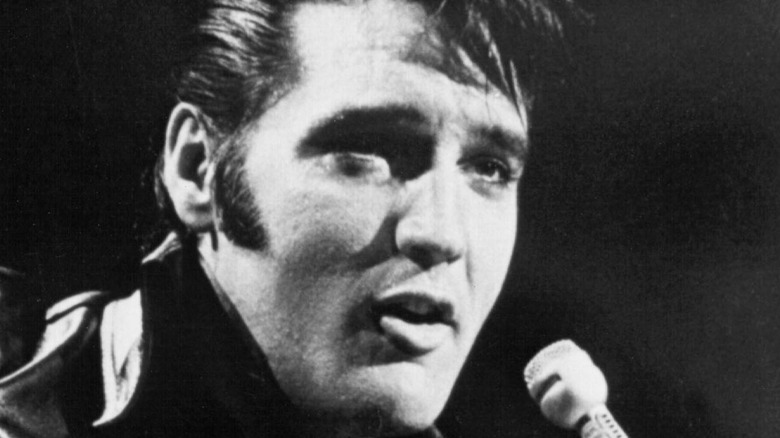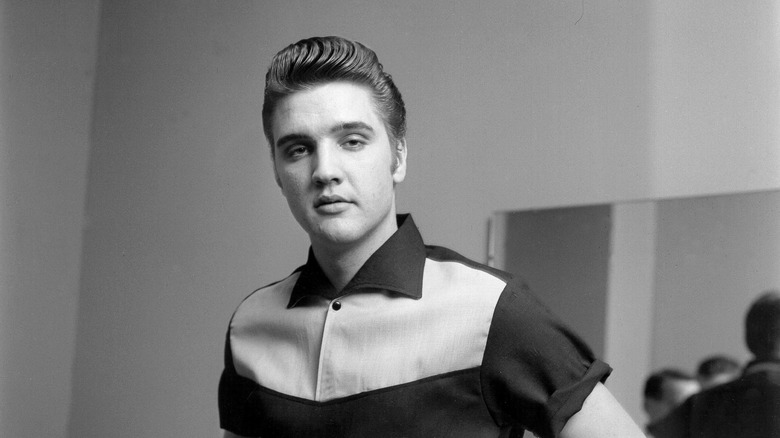Quincy Jones' Bold Claim About Elvis Presley Has People Talking
Elvis Presley has gone down in history as quite possibly the most influential musician of his generation. His career had a few low points, such as his utterly forgettable film work, and his final years were marked by addiction, obesity, and poor health. His music, however, has consistently spoken for itself, and continues to do so today.
Presley, like everyone else, was far from perfect, and his character flaws are as much a part of the man's narrative as his music. He had a famously short temper, for example, as well as a fondness for underage girls, according to The Express. He once went to the White House to volunteer to help then-President Richard Nixon with the War on Drugs in some unspecified way, according to Time Magazine, even though he himself was struggling with addiction issues. And certainly there was a list of celebrities Elvis couldn't stand.
In May 2021, legendary musician Quincy Jones accused The King of having another character flaw: racism. Specifically, the producer claimed that he and another musician refused to work with Elvis because of that racism. What did the famed arranger and producer have to say about Elvis' attitudes on race?
In a 2021 interview with The Hollywood Reporter, an 88-year-old Jones claimed that at some unspecified time in the 1950s, he and big-band leader Tommy Dorsey were working when Elvis walked into the room. "Tommy said, 'I don't want to play with him,'" Jones said, adding, "He was a racist mother–."
Jones claimed that he and Tommy Dorsey refused to work with Presley
Quincy Jones (above) also claimed, per The Hollywood Reporter, that every time he saw Elvis, the "Blue Suede Shoes" performer was accompanied by a Black man, songwriter Otis Blackwell, coaching The King on how to sing.
So is there any truth to Jones' claims about Elvis supposedly being racist? That's impossible to answer, as the purported event happened 70 years ago, and two of the three people who were in the room that day have been gone for decades. Further, specific to Jones' claim about Blackwell: that may be a fabrication. As THR pointed out, Blackwell told David Letterman during an interview in 1984 that he never met Elvis (posted on YouTube).
Similarly, according to the Jim Crow Museum of Racist Memorabilia, there's no evidence that Presley was racist. History points to the contrary: He donated money to Black causes, attended predominantly Black churches during his youth in Tupelo, Mississippi, and consistently treated the Black people he encountered with respect.
Other accusations of racism
On the other hand, Quincy Jones is far from the first person to accuse Elvis Presley of racism. As reported by Inside Hook, rap legends Public Enemy famously sang in their 1989 song "Fight The Power," "Elvis was a hero to most, but he never meant s— to me/Straight up racist the sucker was." Also, in 2002 Mary J. Blige (pictured above) performed "Blue Suede Shoes" on VH1's "Divas Live" special. Some criticized her for singing an Elvis song during her set, and she reportedly told the Atlanta Journal-Constitution, "I prayed about it because I know Elvis was a racist. But that was just a song VH1 asked me to sing. It meant nothing to me. I didn't wear an Elvis flag. I didn't represent Elvis that day."
While Elvis is no longer around to face these accusations, we can turn to sources that date back to his era. For example, a reporter questioned Presley in 1957 about whether or not he'd said a particular racist slur, and he denied it (via Ferris State University). "I never said anything like that, and people who know me know I wouldn't have said it," he told the reporter at the time.
Elvis Presley: 'King of Cultural Appropriation?'
Regardless of whether or not Elvis Presley actually used racist slurs or made racist comments, it's been said that he got rich and made history from living and working as a white performer who co-opted traditional African-American music. The Conversation noted that Presley has been called "the king of cultural appropriation." After all, his hit song "Hound Dog," released in 1956, is so closely associated with Presley that many probably assume it's an Elvis original. However, R & B singer Big Mama Thorton first recorded the Jerry Lieber and Mike Stoller song in 1952, per History. It was a smash on the R & B charts, staying in the No. 1 position for seven weeks, and Thorton's version has since been honored in a myriad of ways, including being inducted into the Grammy Hall of Fame in 2013, as reported by Rolling Stone — pretty impressive.
But Presley's version, as reported in the book "Music of the Postwar Era," topped the Billboard pop charts four times in 1956, sold over 10 million copies, and is one of the best-selling singles of all time.



